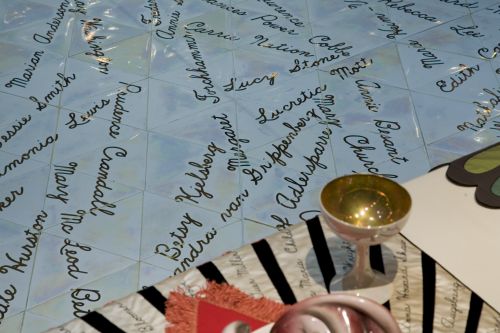Jane Weston
b. 1582, Chipping Norton, Oxfordshire, England; d. 1612, Prague
Elizabeth Jane Weston’s short life is worthy of dramatic treatment. Her father died when she was two, and her mother, Joanna, shortly remarried a man named Edward Kelley, a huckster trafficking in magic. In the mid-1580s, Kelley obtained a post in Prague as the alchemist to Emperor Rudolf II. Joanna accompanied her husband to Prague; Jane and her brother followed a few years later, meanwhile living with their grandparents. For a while Kelley prospered and was even knighted, but around 1591 relations with the emperor soured; reports differ as to why—Kelley may have been involved in a duel that killed a member of the court, but it is also claimed that Rudolf had grown tired of waiting for him to make good on his boast that he could alchemize gold. In any event, he was arrested and died in prison in 1597. Throughout this ordeal, his stepdaughter Elizabeth remained loyal to him. Now virtually destitute with a mother to support, she made the unprecedented decision to earn a living through writing. It is unclear where she received an education, but when she took up the pen, it was to write in Latin, the classical language of scholarship. The humanist community responded enthusiastically, hailing her as the Tenth Muse. In 1602, the Silesian aristocrat George Martinius von Baldhoven published a two-volume edition of her writings entitled Poëmata. The next year, Weston married the lawyer Johannes Leo, and continued to write through seven pregnancies until her death by consumption at the age of thirty.

Related Place Setting
Related Heritage Floor Entries
- Anna Sophia
- Anne Bacon
- Catherine II
- Catherine of Aragon
- Georgiana Cavendish
- Christina of Sweden
- Jeanne D’Albret
- Elizabeth Danviers
- Maria de Coste Blanche
- Penette de Guillet
- Isabella de Joya Roseres
- Maria-Christine de Lalaing
- Catherine Fisher
- Kenau Hasselaer
- Elizabeth Hoby
- Isabella of Castile
- Jadwiga
- Jane of Sutherland
- Sarah Jennings
- Helene Kottauer
- Lilliard
- Isabella Losa
- Elizabeth Lucar
- Margaret of Austria
- Margaret of Desmond
- Margaret of Navarre
- Margaret of Scandinavia
- Maria Theresa
- Mary of Hungary
- Gracia Mendesa
- Grace O’Malley
- Catherine Pavlovna
- Elizabeth Petrovna
- Philippa of Hainault
- Oliva Sabuco
- Mary Sidney
- Sophia of Mechlenberg
- Elizabeth Talbot